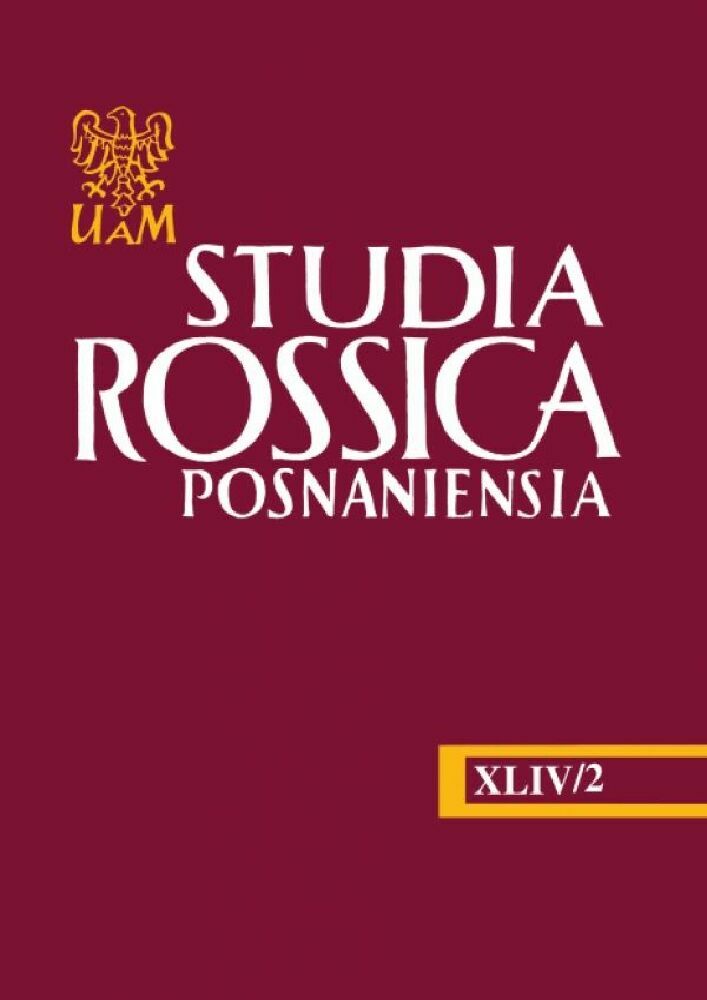Abstrakt
The article presents the interpretation of two Russian films, Travelling with Pets by Vera Storozheva and Taxi Blues by Pavel Lungin, from the point of view of the category of nostalgia. The article shows that the heroes of both artistic texts function in the hybrid reality, the collapse of the old world accompanies their search for the wholeness and new identity. Travelling with Pets emphasizes the spatial dimension of the experience, whereas Taxi Blues transforms it into the vision of the relationship with time, the continuum of past, present and future, which corresponds with the triad: history-memory-nostalgia.Bibliografia
Бакина Т. В. 2014. Образ прошлого и ностальгичeское переживание в кинематографе, Москва: Издательский дом Высшей школы экономики.
Каспэ И. 2008. Съесть прошлое. Идеология и повседневность гастрономической ностальгии, [w:] А. М. Никулин, Пути России: культура – общество – человек, Москва: Логос.
Appadurai A. 1996. Modernity at Large, Minneapolis: University of Minnesota Press.
Boym S. 2001. The Future of Nostalgia, źródło elektroniczne: https://sculptureatpratt.files.wordpress.com/2015/07/svetlana-boym-the-future-of-nostalgia.pdf (dostęp: 19.05.2017).
Czapliński P. 2001. Wzniosłe tęsknoty. Nostalgie w prozie lat dziewięćdziesiątych, Kraków: Wydawnictwo Literackie.
Davis F. 1979. Yearning for Yesterday: A Sociology of Nostalgia, New York: Free.
Hutcheon L. 2000. Irony, Nostalgia, and the Postmodern, źródło elektroniczne: http://www.library.utoronto.ca/utel/criticism/hutchinp.html (dostęp: 19.05.2017).
Jameson F. 1982. Postmodernism and Consumer Society, źródło elektroniczne: http://art.ucsc.edu/sites/default/files/Jameson_Postmodernism_and_Consumer_Society.pdf (dostęp: 19.05.2017).
Maier Ch. S. 1999. The End of Longing? Notes toward a History of Postwar German National Longing, [w:] J. S. Brady, B. Crawford, S. E. Wiliarty (red.) The Postwar Transformation of Germany: Democracy, Prosperity, and Nationhood, Ann Arbor: University of Michigan Press.
Monastireva-Ansdell E. 2008. One Size Does Not Fit All: Trains, Fashions, Mammals, and the Meaning of Life in Vera Storozheva’s “Traveling with Pets”, źródło elektroniczne: http://www.kinokultura.com/2008/19r-puteshestvie.shtml (dostęp: 19.05.2017).
Pickering M., Keightley E. 2006. The Modalities of Nostalgia, „Current Sociology”, t. 54, nr 6.
Seckler D. A. 2009. Engendering Genre: the Contemporary Russian Buddy Film, źródło elektroniczne: http://d-scholarship.pitt.edu/10213/1/Diss_Seckler_2009.pdf (dostęp: 19.05.2017).
Yang G. 2003. China’s Zhiqing Generation: Nostalgia, Identity, and Cultural Residence in the 1990s, „Modern China”, t. 29, nr 3.
Zamarajewa A. 2014. „W poszukiwaniu utraconych obrazów. Nostalgia postsowiecka w polityce symbolicznej Rosji”, Warszawa [praca doktorska].
Žižek S. 2011. Lacrimae rerum. Kieślowski, Hitchcock, Tarkowski, Lynch, Warszawa: Wydawnictwo Krytyki Politycznej.
Licencja
PRACE PUBLIKOWANE W CZASOPIŚMIE DOSTĘPNE SĄ NA LICENCJI CREATIVE COMMONS:
Uznanie autorstwa-Użycie niekomercyjne-Na tych samych warunkach 4.0 Międzynarodowe.
Autorzy tekstów przyjętych do publikacji w czasopiśmie „Studia Rossica Posnaniensia” są zobowiązani do wypełnienia, podpisania i odesłania na adres redakcji umowy o udzielenie nieodpłatnej licencji do utworów, z zobowiązaniem do udzielania sublicencji Creative Commons.
Zgodnie z umową, autorzy tekstów opublikowanych w czasopiśmie “Studia Rossica Posnaniensia” udzielają Uniwersytetowi im. Adama Mickiewicza w Poznaniu niewyłącznej i nieodpłatnej licencji oraz zezwalają na użycie sublicencji Attribution-NonCommercial-ShareAlike 4.0 International (CC BY-NC-SA 4.0).
Autorzy zachowują prawa do dalszego, swobodnego rozporządzania utworem.
Autorzy, którzy wykorzystują w swoim tekście cudze utwory (np. ilustracje, fotografie) proszeni są o dostarczenie do redakcji czasopisma zgody na publikację.
Użytkownicy internetu uprawnieni są do korzystania z utworów opublikowanych po 2015 roku “Studia Rossica Posnaniensia” tylko w celach niekomercyjnych, pod następującymi warunkami:
https://creativecommons.org/licenses/by-nc-sa/4.0/
Uniwersytet im. Adama Mickiewicza w Poznaniu zachowuje prawo do czasopisma jako całości (układ, forma graficzna, tytuł, projekt okładki, logo itp.).

